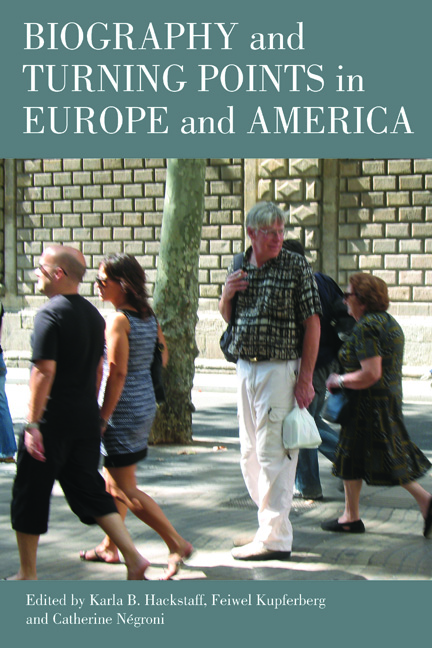Book contents
- Frontmatter
- Contents
- Notes on contributors
- Introduction: Advancing the dialogue on turning points
- one Unpacking biographical narratives: investigating stories of artistic careers in Northern Jutland, Denmark
- two Turning points in the life course: a narrative concept in professional bifurcations
- three Conjugal separation and immigration in the life course of immigrant single mothers in Québec
- four Migration biography and ethnic identity: on the discontinuity of biographical experience and how turning points affect the ethnicisation of biography
- five Biographical structuring through a critical life event: parental loss during childhood
- six Decisive turning points in life trajectories of violence among young men in the barrios of Caracas: the initiation and biographical reconversion to non-violent lifestyles
- seven The turning points of the single life course in Budapest, Hungary
- eight Complicating actions and complicated lives: raising questions about narrative theory through an exploration of lesbian lives
- nine Religious conversion as a biographical turn/ing: the case of Orthodox believers in contemporary Russia
- ten Conclusion: theorising turning points and decoding narratives
- Index
one - Unpacking biographical narratives: investigating stories of artistic careers in Northern Jutland, Denmark
Published online by Cambridge University Press: 01 September 2022
- Frontmatter
- Contents
- Notes on contributors
- Introduction: Advancing the dialogue on turning points
- one Unpacking biographical narratives: investigating stories of artistic careers in Northern Jutland, Denmark
- two Turning points in the life course: a narrative concept in professional bifurcations
- three Conjugal separation and immigration in the life course of immigrant single mothers in Québec
- four Migration biography and ethnic identity: on the discontinuity of biographical experience and how turning points affect the ethnicisation of biography
- five Biographical structuring through a critical life event: parental loss during childhood
- six Decisive turning points in life trajectories of violence among young men in the barrios of Caracas: the initiation and biographical reconversion to non-violent lifestyles
- seven The turning points of the single life course in Budapest, Hungary
- eight Complicating actions and complicated lives: raising questions about narrative theory through an exploration of lesbian lives
- nine Religious conversion as a biographical turn/ing: the case of Orthodox believers in contemporary Russia
- ten Conclusion: theorising turning points and decoding narratives
- Index
Summary
The concerns of sociologists when engaging in biography research are different from both the caring professions and oral history. Although there are clear parallels between, in particular, oral history and sociological biography research concerning methodological issues related to how to conduct and interpret biographical interviews (Charlton et al, 2007; Perks and Thomson, 2009), there are also important theoretical and conceptual differences. The latter originate from the knowledge interest of sociologists that partly coincide with but are nevertheless slightly different from historians.This can be illustrated by the works of Alessandro Portelli (1981, 1991, 2003). What mostly interests Portelli is how Italians who participated in the Second World War interpreted this single historical event. What were the moral lessons they drew and how did they create meaning out of it? Sociological biography research is also interested in events, indeed the concept ‘turning point’ can only be understood or conceptualised as an event. It is not action, or structure, or order; it is something elusive from a sociological point of view, since ‘events’ do not have any strict or stable status in sociological theorising. The very concept belongs to a different intellectual terrain, the country in which the professional historian feels at home but where the sociologist feels at a loss. In order to become comfortable with this elusive concept, sociologists need to translate it into their own language of action, structure and order.The problem of translation between disciplines has been a cornerstone in Thomas Kuhn's works on the history of science (1962, 1974, 1977, 2000). What Kuhn suggests is that all scientists or scholars are trained in a particular discipline and that this training has far-reaching effects on how they understand what science is or how to go about working in a scientifically legitimate manner. This close identification with one's disciplines creates problems of translation. It is not only that the same phenomena, say, a ‘biographical interview’ is described with different words (biographical interview/oral history) – these words actually do not mean exactly the same things.Psychologists of memory (Lundh et al, 1992) talk of semantic networks and nodes that connect words and phenomena described by words, but these networks are never identical, which means that translations are never exact, only approximate.
- Type
- Chapter
- Information
- Biography and Turning Points in Europe and America , pp. 9 - 40Publisher: Bristol University PressPrint publication year: 2012



